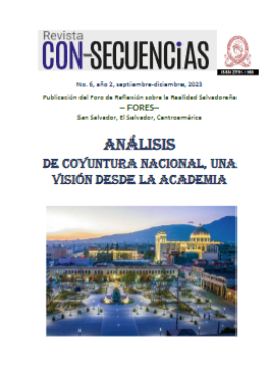RELEVANCE OF EL SALVADOR'S STRATEGIC POSITION IN CURRENT LATIN AMERICAN GEOPOLITICS
Keywords:
Business, El Salvador, Geopolitics, GeostrategyAbstract
El Salvador is a country geographically small, but of great geopolitical interest for both Central America and Latin America as a whole. Its relevance comes mainly from its geostrategic location in the middle of the American continent. Historical events have not been very favorable during the 20th century: it has suffered massacres, war between countries, civil war, as well as growth, expansion and practically the domination of many territories by gangs (maras). On the other hand, the business opportunities that have opened in a globalized world are great, and El Salvador as a country and as a government is knowing how to respond to these new circumstances of the regional and global scenery, but also investors and entrepreneurs can take advantage of the competitive conditions that El Salvador offers.
Downloads
References
Black, J. (2015). Geopolitics and the Quest for Dominance. Indiana University Press.
Brzezinski, Z. (1997). The grand chessboard: American primacy and its geostrategic imperatives.
Brzezinski, Z. (2009). The choice: Global domination or global leadership. Basic Books.
Cohen, S. B. (2014). Geopolitics: the geography of international relations. Rowman & Littlefield.
Dalby, S., Routledge, P., & Tuathail, G. Ó. (1998). The geopolitics reader. Routledge.
Dalby, S. (2014). Critical Geopolitics and the Control of Arms in the 21st Century. In Reconceptualising Arms Control (pp. 48-64). Routledge.
Edward N. Luttwak (1990), “From Geopolitics to Geo-Economics: Logic of Conflict, Grammar of Commerce”, en The national Interest, pp. 17-23.
Geopolitics: The politics of writing global space (Vol. 6).
Grygiel, J. J. (2006). Great powers and geopolitical change. JHU Press.
Kaplan, R. D. (2009). The revenge of geography. Foreign Policy, 172.
Kelly, P. (2016). Classical geopolitics: a new analytical Model. Stanford University Press.
Kissinger, H. (1994). Diplomacy. Simon and Schuster.
Kissinger, H. (2015). World order. Penguin Books.
Leonard, M. (2016). Connectivity wars. Why migration, finance and trade are the geo-economic battlegrounds of the future
Luttwak, E. N. (1990). From geopolitics to geo-economics: Logic of conflict, grammar of commerce. The National Interest, (20), 17-23.
Mackinder, H. J. (1904). The geographical pivot of history.
Mackinder, H. J. (1942). Democratic ideals and reality a study in the politics of reconstruction.
Mackinder, H. J. (1942). The round world and the winning of the peace.
Mahan, A. T. (1890). The influence of sea power upon history, 1660-1783.
Morgenthau, H. J. (1948). Politics Among Nations: The Struggle For Power and Peace. New York: Alfred A. Knopf Inc.
Spykman, N. J. (1938). Geography and foreign policy, I. American political science review, 32(1), 28-50.
Spykman, N. J., & Rollins, A. A. (1939). Geographic objectives in foreign policy, I. American Political Science Review, 33(3), 391-410.
Spykman, N. J., & Nicholl, H. R. (1944). Geography of the Peace.
Tuathail, G. Ó. (1996). Critical Kennedy, P. (1987). The rise and fall of the great powers.
Published
How to Cite
Issue
Section
License

This work is licensed under a Creative Commons Attribution-NonCommercial 4.0 International License.





